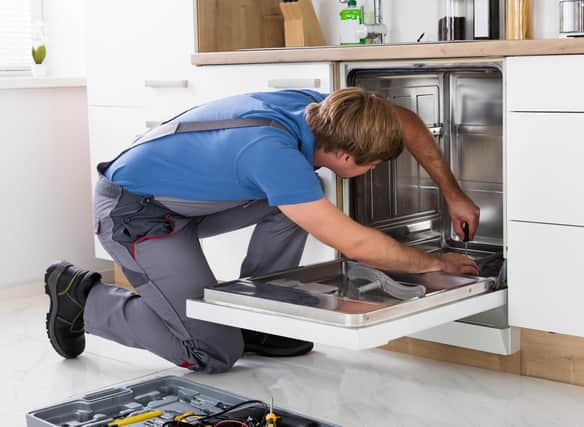What is Right to Repair? How will it affect consumers? What appliances will count?


The legislation aims to tackle electrical waste and energy inefficiency woes for consumers buying more white goods and appliances than perhaps ever before, with Right to Repair rules designed to tackle the 1.5 million tonnes of electrical waste generated in the UK every year by extending the lifespan of products by up to 10 years.
This, the UK Government hopes, will prevent appliances ending up on the scrap heap sooner than they should and reduce carbon emissions at the same time.
Advertisement
Hide AdAdvertisement
Hide AdMinister of state for energy Anne-Marie Trevelyan said: "The tougher standards coming in today will ensure more of our electrical goods can be fixed rather than have to be thrown away when they stop working, putting more money back in the pockets of consumers, as we build back greener."
Here’s what you need to know about Right to Repair.
What is Right to Repair?
Under the new rules, manufacturers must make home products such as washing machines and dishwashers easier to repair under new standards coming into force on July 1.
Manufacturers are now legally obliged to make spare parts for products available to consumers for the first time - a new legal right for repairs - so that electrical appliances can be fixed easily.
These spare parts must be made available in no longer than two years after an appliance or product is put up for sale, with certain types of spare part products and fixtures expected to remain available between seven to ten years after an appliance has been discontinued.
Advertisement
Hide AdAdvertisement
Hide AdAdam French, Which? Consumer Rights Expert, said: "Too often electrical items end up in landfill because they are either too costly or difficult to fix, so these new rules requiring manufacturers to make spare parts more widely available are a step in the right direction and should ensure products last longer and help reduce electrical waste.
"As a next step, we want the Government to extend these rules to cover more appliances, ensure the parts are available throughout the lifespan of each product and are easily affordable."
What does it mean for customers?
While the rules claim to restore power and consumer rights to consumers, many commentators have criticised the law as not going far enough in benefitting consumers.
This is because the law, in essence, requires manufacturers to supply customers with the necessary parts to complete a repair – which can still be a costly process if this is required outside of a product’s warranty or guarantee.
Advertisement
Hide AdAdvertisement
Hide AdWhile manufacturers are now legally bound to make spare parts more widely available in order to help products survive for longer, the rules are more centred around producers of goods than customers.
For instance, many of the spare parts now mandated to be available need only be supplied to professional repairers, while only some others are expected to be available for all consumers.
What appliances and spare parts will count for Right to Repair?
White goods such as fridges, washing machines, dishwashers, tumble-dryers and televisions are included among the electrical appliances which now fall under Right to Repair rules for manufacturers to tackle "premature obsolescence".
The legislation takes aim at the process whereby a short lifespan is deliberately built into an appliance by manufacturers, leading to unnecessary and costly replacements for the consumer.
Advertisement
Hide AdAdvertisement
Hide AdAmong the spare parts expected to be made available to professional repairers for a minimum period of seven years after placing the last unit of the model on the market include circulation and drain pumps, electronic displays, motors, piping equipment such as hoses, valves and filters, thermostats and sensors and heat pumps.
Those required to be available to all consumers for up to ten years include door hinges and door seals, drain filters, interior racks and plastic peripherals such as baskets and lids, and other types of seals.
Additional reporting by PA Consumer Affairs correspondent Josie Clarke.
A message from the Editor:
Thank you for reading this article. We're more reliant on your support than ever as the shift in consumer habits brought about by coronavirus impacts our advertisers.
If you haven't already, please consider supporting our trusted, fact-checked journalism by taking out a digital subscription.
Comment Guidelines
National World encourages reader discussion on our stories. User feedback, insights and back-and-forth exchanges add a rich layer of context to reporting. Please review our Community Guidelines before commenting.